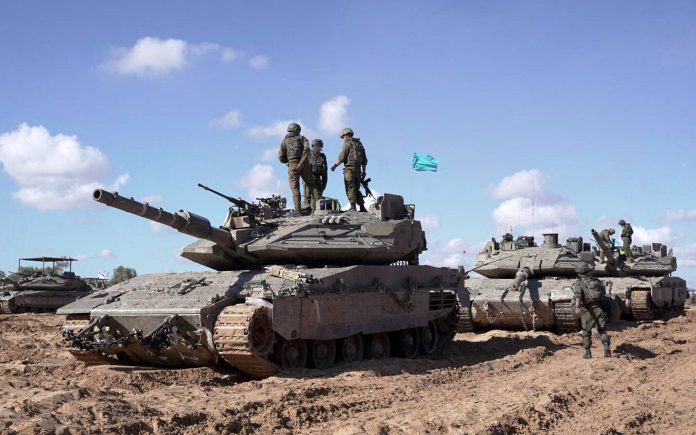Israel has still shown no signs of cancelling the Rafah operation despite yesterday’s court ruling. Egypt agreed to send humanitarian aid through the main crossing point, but security concerns are in doubt, according to AP News.
The International Court of Justice (ICJ) on Friday ordered Israel to halt its offensive in Rafah province. It was a landmark emergency ruling in a case brought by South Africa accusing Israel of genocide in its attack on the Gaza Strip. The ruling exacerbated his differences with the United States.
But the World Court does not have the means to enforce its orders, and Israeli War Cabinet Minister Benny Gantz said Israel would continue its war against the Hamas militant group to retrieve its hostages and ensure its security.
Hamas said it welcomed the World Court ruling but said it was not enough “since the occupation aggression across the Gaza Strip and especially in northern Gaza is just as brutal and dangerous.”
Israel and United States
US officials describe Israel’s operation as “limited and targeted,” but the Biden administration still opposes a major offensive in Rafah. The White House also insists that steps taken by its close ally Israel so far have not crossed red lines.
The rhetoric slightly lightened after national security adviser Jake Sullivan returned from a visit to Israel, where he said he was briefed on “refinements” to Israel’s plan to root out Hamas in Rafah and Saudi Arabia. The Israeli side addressed many of Biden’s concerns about its plans for Rafah. He said:
What we have seen so far in terms of Israel’s military operations in that area has been more targeted and limited, has not involved major military operations into the heart of dense urban areas.
Earlier this month, the White House announced it was suspending the delivery of some 3,500 bombs, including a massive 2,000-pound explosive that the Biden administration said had caused civilian deaths. The major operation thus represents a red line that will undermine the stalled negotiations on an agreement to return Israeli hostages taken by Hamas and force Biden to further backtrack on what weapons he will send to Israel.
That assessment may offer little comfort to Palestinians still trapped in Rafah. Over 1 million people have sought refuge there in recent months after fleeing fighting elsewhere, but some 900,000 have since fled the city. Displaced Palestinian man Nabil Diab told Reuters palestinians needed an immediate halt to the war and they wanted to see action to achieve that: “We don’t need a declaration.”
Washington, however, has made it clear that it remains opposed to a more intrusive operation in Gaza. The administration does not believe a major offensive would produce the results Israel seeks. Secretary of State Antony Blinken told the House Foreign Affairs Committee on Wednesday:
When it comes to Rafah, we’ve made known for a long time our concerns about a full-on military assault of Rafah and the damage that that could do to civilian population absent a clear and credible plan to protect it.
Humanitarian situation still at breaking point
The humanitarian crisis in Gaza has escalated sharply as the UN and other aid agencies say the flow of food and other supplies has plummeted since Israel’s offensive on Rafah began more than a fortnight ago. It has received just 906 lorries from the crossing in the past 19 days. The Gaza side of the crossing has gone unnoticed, according to Israeli officials, who say a limited UN labour force is to blame.
The Agency for International Development says Gaza needs a steady stream of 600 truckloads a day of food and other aid to reverse the coming famine. The World Food Programme calls the famine in the north and to keep it from spreading to the south.
Israel says it has brought hundreds of lorries through the other main border crossing, Kerem Shalom, but the UN and aid groups say Israeli military operations make it dangerous for them to take food, water and other supplies to hungry Palestinians.
Even with the pier in the US bring a small amount of aid by sea, Gaza has received only a fraction of the supplies it needs since the Israeli offensive began.
Egypt agreed to send aid through the main crossing
Egypt said on Friday it had agreed to send UN humanitarian aid trucks through Israel’s main crossing into Gaza, but it was unclear whether they would be able to enter the territory as fighting raged in the southern city of Rafah amid the Israeli offensive.
During a phone call with the US President Joe Biden on Friday, Egyptian President Abdel Fattah al-Sisi agreed to allow humanitarian aid and fuel trucks to go to the Kerem Shalom crossing until a solution is found for the Rafah crossing, al-Sissi’s office said.
Israel, in turn, says it has left the Rafah crossing open and has asked Egypt to coordinate with it to send humanitarian aid convoys through it. But it remained unclear whether the UN would be able to access the additional trucks coming from Egypt.
Mercy Corps, an aid group operating in the Gaza Strip, said in a statement on Friday that the offensive had caused the “functional closure … of the two main lifelines” of aid and “has brought the humanitarian system to its knees.”
If dramatic changes do not occur, including opening all border crossings to safely surge aid into these areas, we fear that a wave of secondary mortality will result, with people succumbing to the combination of hunger, lack of clean water and sanitation, and the spread of disease in areas where there is little medical care.
The war in Gaza followed an attack on Israel on 7 October that killed about 1,200 people and captured 250 others. Over 35,000 Palestinians have been killed in the Gaza Strip, according to the health ministry in Gaza.
Israel has so far given no sign that it intends to change course after Friday’s ruling.
